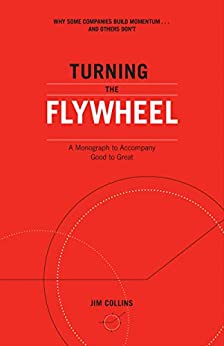More on this book
Community
Kindle Notes & Highlights
by
Jim Collins
Read between
March 11 - March 12, 2019
across all our rigorous matched-pair research studies (Built to Last, Good to Great, How the Mighty Fall, and Great by Choice), we found no systematic correlation between achieving the highest levels of performance and being first into the game.
Teaching is a relationship, not a transaction,
you can improve only if you know how you’re doing
The very nature of a flywheel—that it depends upon getting the sequence right and that every component depends on all the other components—means that you simply cannot falter on any primary component and sustain momentum
There are two possible explanations for a stalled or stuck flywheel. Possible explanation #1: The underlying flywheel is just fine, but you’re failing to innovate and execute brilliantly on every single component; the flywheel needs to be reinvigorated. Possible explanation #2: The underlying flywheel no longer fits reality and must be changed in some significant way. It’s imperative that you make the right diagnosis.
The big successes tended to make big bets after they’d empirically validated that the bet would pay off, whereas the less successful comparisons tended to make big bets before having empirical validation. We coined the concept fire bullets, then cannonballs to capture the difference.
The big winners are those who take a flywheel from ten turns to a billion turns rather than crank through ten turns, start over with a new flywheel, push it to ten turns, only to divert energy into yet another new flywheel, then another and another.
An overarching theme across our research findings is the role of discipline in separating the great from the mediocre.
Retain absolute faith that you can and will prevail in the end, regardless of the difficulties, and at the same time, exercise the discipline to confront the most brutal facts of your current reality,
The Hedgehog Concept is a simple, crystalline concept that flows from deep understanding about the intersection of the following three circles: (1) what you’re deeply passionate about, (2) what you can be the best in the world at, and (3) what drives your economic or resource engine.
The only mistakes you can learn from are the ones you survive.
Our research showed that the great companies were not generally luckier than the comparisons—they didn’t get more good luck, less bad luck, bigger spikes of luck, or better timing of luck. Instead, they got a higher return on luck, making more of their luck than others.


